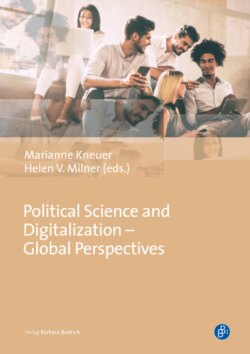Читать книгу Political Science and Digitalization - Global Perspectives - Группа авторов - Страница 28
На сайте Литреса книга снята с продажи.
2 Teaching political science in Mexico: digital tools and teaching methods
ОглавлениеThe new trend in digital education has three main digital tools: online courses, use of social media and digital contents and management. Last summer, in the Autonomous university of the State of Mexico, several courses for teachers were based on online teaching: online education; teaching tools for online environments; use of MSN tools for teaching, among others. Most social sciences professors learned several tools, basic or advanced skills for their teaching process. However, very few of them applied them immediately for their courses.
A second digital tool is the use of social media. Mexican students are immersed in social network sites (SNS). According to the Mexican Internet Association, young people spend eight hours on the SNS; the majority have an account on Facebook1. Therefore, it is important that teaching reaches students using these platforms. Another training course for teachers focused on the use of SNS for teaching, where many of them complement their offline class discussion with an online discussion.
There are different risks, privacy, personal data, and bullying, which have not been considered yet in these courses. This is important because online teaching is very different from offline teaching; rules apply differently to each context and teachers need to adapt to these rules. Several universities in Mexico are aware of this problem, and they have implemented their own SNS or closer environment for teaching. The Autonomous University of the State of Mexico developed an online platform called SEDUCA (Educational Digital Services for University2). However, very few university teachers use this tool, they prefer other tools such as Schoology or Facebook to manage their courses or promote online participation. Likewise, the Autonomous university of the State of Mexico, recently opened an online repository (see the link: http://ri.uaemex.mx/) for digital content, that includes papers, complete books, thesis, journal articles from the university professorship [44] to promote the open access policy for all the material that could be used for preparing lectures of different subjects3.
The university of the State of Mexico opened three courses for Mexican teachers in summer of 2017, two of them related to teaching using ICT on different platforms such as Moddle and Schoology and one more for using Facebook for teaching. Unfortunately, at the time of writing these lines, there were no coordinated efforts, such as a plan or public policies to adapt teaching methods and strategies to communicate with students inside the university. Most teachers decided to adapt themselves using different tools and methods, and many others adapted their syllabus or classroom practices to some platform – Facebook – or technology like mobile phones. On the other hand, as mentioned earlier, there is a strong resistance from senior teachers to use this kind of technology in their courses, and they continue using their traditional offline teaching, using printed books or photocopies.
